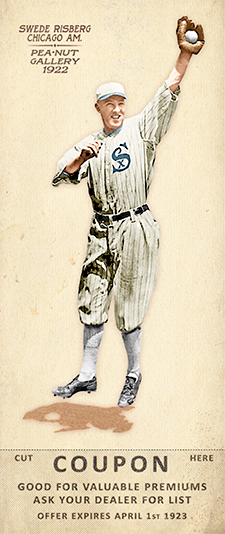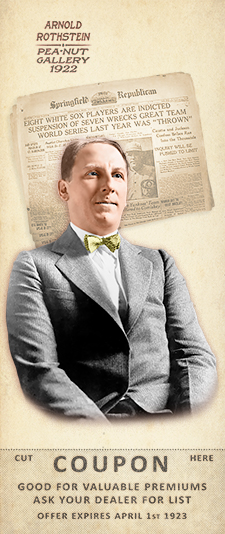
- Series: 1919 Black Sox Scandal
- City: Chicago
- Team: White Sox
- League: American League
Charles August Risberg (1894-1975) grew up on the streets of San Francisco, dropping out of school in the third grade. He had a flair for baseball and, when he switched to shortstop, he blossomed into a defensive star worthy of a call-up to the White Sox in 1917. Swede’s minor league experience foreshadowed the future outlaw character he would display almost from his arrival in the big leagues. In 1913, when Risberg traveled to the LA area to play in the Pacific Coast League, he was drawn to the Vernon/Venice Tigers. At that time these were the only communities in Los Angeles county that were “wet.” Booze was the defining identifier for owner Pete Maier’s club. When it was in Vernon fans could enter the park directly from Doyle’s bar.
Risberg made the big club based on his defense, but hit so poorly in his rookie season that he only got two pinch hitting appearances in the ‘17 Series when the Sox beat the Giants. Swede returned to California for part of the 1918 season, escaping the draft by taking a shipyard job that amounted mostly to playing semi-pro ball for the company during that “work or fight” year. By his own testimony, Swede was crooked throughout his major league tenure, all with Chicago. He claimed to have been the organizer of a scheme in 1917 to bribe Tiger players to throw some games. And he was at the center of the Black Sox Scandal in 1919. Later many would assert that, despite the clear conspiracy with gamblers, the Reds won fair and square although they were thought to be far inferior to Chicago. It is difficult to make a case from the players’ performance. Risberg would be an exception. He apparently threw himself into the fix with zeal, committing a record eight errors and going 2 for 25 at bat. And his reported payout of $15,000, which was more than four times his salary, was a far bigger reward than others realized. He may have earned his bonus because he served as an enforcer. Joe Jackson received a death threat from Risberg if he “blabbed.” Shoeless Joe would later describe Swede as a “hard guy.”
- True to his scofflaw nature, Risberg defied Judge Landis’ ban and played exhibition ball for years. As the youngest of the “Eight Men Out,” and having a very brief tour in the majors, he had incentive to play wherever he could
- It may be that the game he tarnished got its revenge. Swede had been spiked in Chicago and the wound never properly healed. He lost the leg in his old age, dying in a nursing home in Redding, CA on his 81st birthday

- Series: 1919 Black Sox Scandal
Arnold Rothstein (1882-1928) has been described by historian Leo Katcher as “the J.P.Morgan of the underworld; its banker and master of strategy.” Born into a wealthy New York Jewish family, Rothstein would use his vaunted intelligence to rise to the top of criminal enterprises. Nicknamed the Brain, the Fixer or the Big Bankroll, he was most often known to his underlings as A.R.; and underlings he had. Rothstein was mentor and boss to some of the most notorious gangsters of the 20th century: Meyer Lansky, Legs Diamond, Dutch Schultz, Frank Costello and Lucky Luciano, who said of A.R., “He taught me how to dress...how to use knives and forks and things like that at the dinner table, about holdin’ a door open for a girl. If Arnold had lived a little longer, he could’ve made me pretty elegant.”
Rothstein is credited with making crime a business, using his acumen to organize a network of illicit operations, the godfather before there was a Sicilian Godfather. Per Lansky, “Rothstein had the most remarkable brain. He understood business instinctively and I’m sure that if he had been a legitimate financier he would have been just as rich as he became with his gambling and the other rackets he ran.” His instincts proved very acute when his bodyguard Abe Attell brought him Chick Gandil’s plot to fix the 1919 World Series. Rothstein is said to have rejected the scheme, accurately assessing the harebrained crew of conspirators. After learning that other groups of gamblers were getting involved, some say he fronted $80,000 and then won a fortune betting on the White Sox to lose.
Those bets presaged later huge takes at the track and poker tables that made A.R. the most famous criminal of an increasingly lawless era. The year after the Series fix, Rothstein found the greatest opening a crime lord ever had as Prohibition began. He made massive profits, but got out of the traffic early as he realized he couldn’t control the liquor business to his liking. He was all about control, once remarking that he would bet on anything but the weather because “I can’t fix the weather.”
- As with all of the players and gamblers directly implicated in the Black Sox scandal, Rothstein escaped legal consequences. He testified that he had been asked to participate, but always denied a role
- Slain by a card player who said A.R. had stiffed him on a $300,000 marker, Rothstein took a day to die, taking his killer’s identity to the grave. In a gesture to honor Arnold's upright father, his funeral was officiated by New York’s most prominent Orthodox rabbi

